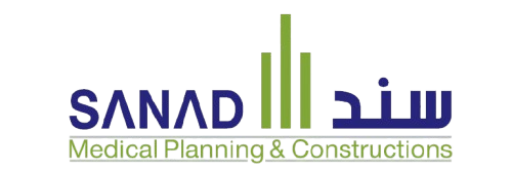Safety and Fire Protection Department
The Safety and Fire Protection Department is a fundamental part of any organization, dedicated to protecting individuals and property from potential hazards. This department encompasses a range of activities and policies aimed at ensuring a safe and healthy working environment and providing preventive measures to reduce risks and incidents.
Main Objectives of the Department:
The significance of the Safety and Fire Protection Department lies in enhancing the security culture within the organization, contributing to:
Challenges Facing the Department:
The Safety and Fire Protection Department acts as the first line of defense against risks and is an integral part of any organization’s strategy aiming to establish a safe and sustainable work environment. Through commitment to training, awareness, and effective measures, risks can be minimized, and safety levels enhanced across all aspects of work.
What We Offer?
Services
Customer Service and Maintenance
Sanad Corporation aims to provide exceptional support and service to all current and potential customers, allowing for easy and direct communication with a dedicated team. The customer service team strives to meet client needs, from product selection and installation to maintenance and efficiency enhancement.
Our service aims to:


Consulting Services
With decades of expertise and a renowned reputation for offering advanced technology at a reasonable cost, in collaboration with a group of specialized local and international consulting institutions, “Sanad Company” is pleased to offer numerous consulting services to its clients through its team and collaborating institutions. These services include site inspections, risk assessment reports, preliminary design, and cost estimation for projects.
Additionally, these services include the preparation of engineering designs, technical specifications, bill of quantities, as well as providing installation drawings and final drawings post-installation. Our company offers supervision on installation, operational testing, and delivery for the systems supplied by us.
Our company has established several policies to ensure the achievement of outstanding quality standards, which include applying the optimal performance concept in technical and aesthetic design aspects and implementing value engineering principles across all services we offer in this field. The company allocates an annual budget to this purpose, including continuous training for our technical team to keep up with the latest developments in the fire protection industry, using the latest versions of local and international standards, and advanced design and calculation programs such as Hydraad & AlarmCad.
These services provide Sanad Corporation with the opportunity to play a significant role in the sustainable development of institutions and communities.
Fire Protection Academy

Sanad Company proudly offers specialized lectures on fire protection, safety, and occupational health in Saudi Arabia, equipped to the highest standards, including fire simulation systems (Simulator) for hands-on firefighting training. This system provides a safe training environment to practically and interactively learn fire protection techniques.
The training also includes all necessary firefighting equipment for realistic training, using the latest ignition and extinguishing devices, focusing on safe and environmentally friendly ignition methods. This training allows trainees to learn the best and safest firefighting techniques, enhancing their skills and confidence in facing emergencies.
Products
Fire Alarm Systems
Fire alarm systems detect fires in their early stages to minimize damage and protect lives and property, alerting individuals to control the fire and reduce its severity.
1 – Conventional alarm system:
A simple alarm system typically used in small areas with low risk levels.
The system includes:
The above components are connected via heat-resistant wires installed inside metal conduits.
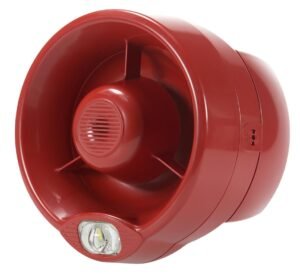
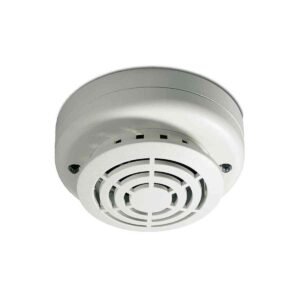
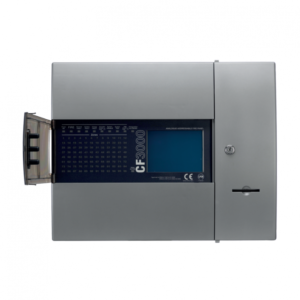
2 – Addressable Alarm System:
The addressable alarm system offers higher accuracy in identifying the fire location, dividing the building into sectors and using a loop method to determine the location of the detector (sensor) on the main panel, simplifying fire location identification in large buildings.
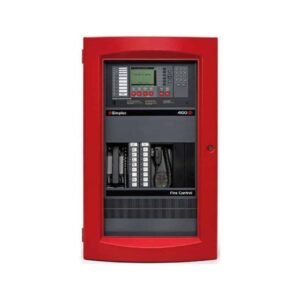

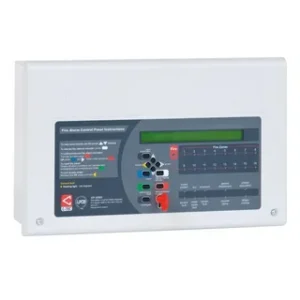
Fire Fighting System
All firefighting systems focus on breaking the fire triangle, consisting of three main elements: fuel (such as wood, clothing, or paper), heat (produced by energy transformation), and oxygen (accelerating the reaction and fire spread).
Fire suppression is achieved by countering one or more fire elements through methods such as cooling, smothering, or isolating the combustible material.
Due to the importance of firefighting systems in residential and non-residential buildings, Sanad Safety Devices Company has given significant attention to this area, particularly with the rapid development in fire protection technology.
1 -Manual Fire Fighting System
Manual firefighting systems are effective in the early stages of fire, affordable, and easy for ordinary people to use, making them essential in all buildings. This category includes:
Fire Extinguisher
A cylinder containing compressed chemical compounds used to break the fire triangle, with different types depending on the extinguishing material, including powder and carbon dioxide extinguishers.


Fire Hose Cabinet
A metal cabinet mounted on walls, containing a hose connected to a pump for high-pressure liquids, with various types, the most common being water and foam hoses.


2- Automatic Fire Fighting System
With technological advancement, many automatic firefighting systems have been developed to minimize risks to lives and property without human intervention. Generally, this type of system is costly compared to others and is typically installed in high-risk areas like factories, workshops, and warehouses.
Wet Fire Fighting System
This system uses water alone or with chemical additives, consisting of a network of pipes with sprinklers distributed throughout the building. Water is pressurized through at least one pump, activating automatically once pressure drops within the pipes.

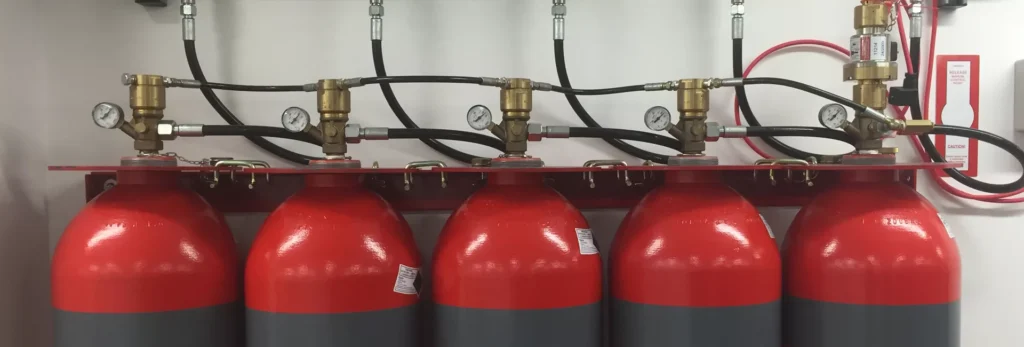
Dry Fire Fighting System
This system uses clean gases such as carbon dioxide or FM200, stored in pressurized cylinders connected to a piping network with nozzles covering the protected area. This system is generally used in areas sensitive to water systems, such as engine rooms and archives.
Our Mission
We strive to advance the field of fire protection and safety systems in the Kingdom by working towards the highest possible protection for individuals, institutions, and the community in Saudi Arabia through advanced scientific and organizational means.
